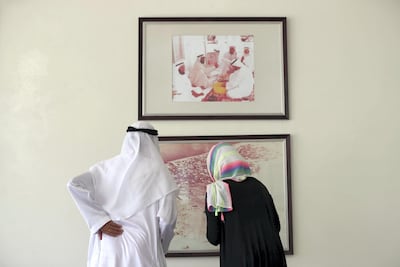For 25 years, hundreds of Ramadan observers have found their way to a fulfilling iftar meal at Saqer Al Mehairbi’s tent.
Passing through his neighbourhood in Al Meharbah, off Al Khaleej Al Arabi Road, you will not lose your way to the Emirati’s property, which has been welcoming about 500 people to break their fast every day during Ramadan.
The tent is outside his mansion, beside a mosque and grocery store under his name. It will continue to serve passers-by iftar meals this year.
“When we started 25 years ago. We used to hold the iftars in the porch outside my mosque next to the house,” says Mr Al Mehairbi, 74, the former director and co-founder of Abu Dhabi Police in 1975.
“The neighbours used to join as well and they would bring some dishes with them. We used to all eat together.”

But since Ramadan started coming in summer more than five years ago, he set up a tent for strangers to have their iftar meals.
Mr Al Mehairbi gathers his sons and grandchildren who live with him, and siblings who moved out a few years ago, in the house’s majlis.
“I have allocated four cooks only for this tent,” he says.
To feed the hundreds of people who flock to his tent, 15 goats are slaughtered and 30 boxes containing 12 pieces of chicken each are prepared.
He says he inherited this tradition from his ancestors and UAE leaders, with whom he was very close.
His majlis is filled with portraits of himself and his children with the Founding Father, Sheikh Zayed. Across the room, there is a photo of Abu Dhabi in 1962.
“This was the first school in Abu Dhabi,” Mr Al Mehairbi says, pointing with his cane. “It was called Al Falahiya. And over there is the first clinic, and here is Al Hosn Palace. There was nothing back then.”
Mr Al Mehairbi also extends his good deeds to Yemen, where he has fed 150 worshippers across five mosques every Ramadan for 15 years.
Unfortunately he had to stop last year, when he was not allowed to transfer money there because of the war.

“Hopefully I’ll be able to send money this year,” Mr Al Mehairbi says.
He is one of many Emiratis who will be setting up their tents over the coming days, after the Abu Dhabi City Municipality announced that it would start receiving applications.
Those who wish to set up tents must go through a licensing procedure that involves temporary permits from the municipality, civil defence checks to ensure safety and security measures, and Abu Dhabi Distribution Company for electrical connections and installations.
If the tent is to be erected on a public road or parking, applicants must receive approval from the police traffic department.
Tents cannot be set up on utility lines or cause damage to those lines, pavements or the street. A tent should not block a street or entry point to building, car parks or emergency exits.
When the tents have been set up, municipality inspectors will visit to ensure the requirements have been met.
____________
Read more:
Donations needed for Dubai Ramadan charity fair for low-income families
UAE donates Dh220 million to 'alleviate suffering of Syrian people'
UNHCR and Tabah Foundation launch zakat donation website to help those in need
____________
Fulfilling all of those requirements takes about a month every year, said Ayham Naji, a public relations officer for Bin Jassim Trading, who has been setting up a Ramadan tent for passers-by to break their fast over the past three years.
“We receive between 150 to 250 people every day,” Mr Naji says.
When his employers decided to put up an iftar charity tent in Mohammed bin Zayed City, they assigned him to seek the approvals because he used to volunteer for similar tents run by the Emirates Red Crescent and the Ministry of Presidential Affairs.
“I like doing this and I am there every day supervising the process,” he says. “As long as the benefactors wish to continue, we will do it every year.”


